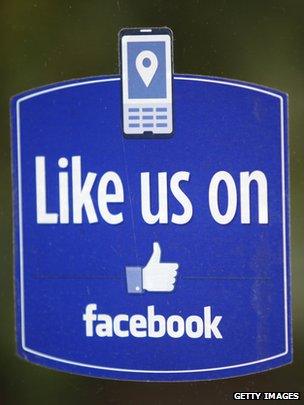Facebook - buy or sell?
- Published
- comments

Will investors like Facebook shares?
It's the week that Facebook shares are likely to start trading in New York, a seismic event in the technology and business world. It promises to be the most valuable stock market debut ever for a technology firm - and there are already expectations that the share price will then soar as investors rush to get in on the act. But suddenly there seem to be quite a few reasons to be bearish about Facebook.
The main cause came from the company itself, which updated its advice to investors in official documents last week to include an extra risk factor:
"[I]ncreased user access to and engagement with Facebook through our mobile products, where we do not currently directly generate meaningful revenue, particularly to the extent that mobile engagement is substituted for engagement with Facebook on personal computers where we monetize usage by displaying ads and other commercial content."
In other words, the future of Facebook is on mobile phones, and we haven't the faintest idea how we make money from that. If you, like many people, spend much of your social networking time staring at a smartphone, you may have noticed something rather refreshing - a lack of advertising cluttering up the valuable real estate of the small screen.
Whatever the claims of a fast growing mobile advertising industry, it is proving hard for Facebook and other companies dependent on ad revenue to insert messages into the mobile conversation.
Mark Zuckerberg's company has responded to this threat with an extraordinary burst of activity in the run-up to the IPO (Initial Public Offering). There was the $1bn purchase of the mobile photo sharing app Instagram, the announcement that Facebook was launching an app store, and, over the weekend, news of trials of a system where users would pay a small fee to make their posts more visible to friends on the network.
But it's not clear any of this will generate a lot of revenue. Putting adverts around Instagram snaps, thereby taking screen space from your pictures, doesn't sound attractive. How Facebook will get much of a payback from an apps store if it is mainly linking to the Apple and Android stores remains to be seen. And, as for paying to make your friends listen to you, asking users to shell out for something that they have always got for free sounds like a no-no.

The future of Facebook is on mobile phones
The other cause for concern for potential investors is the rising tide of anxiety about the implications of sharing so much of our data with the social network. With perfect timing, the Silicon Valley controversialist Andrew Keen has a new book out, Digital Vertigo, which is in essence a diatribe against the "frictionless sharing" that is at the heart of Facebook's business model. "Chillingly Orwellian" is his description of a world where our every move is tracked to generate better advertising returns.
Meanwhile there appears to be a user revolt against the broadcasting of one's media habits on Facebook, with reports that newspaper social reading apps are seeing a rapid decline in usage. Do you really want the world to know you've just read some gossipy diary item in the Guardian, or listened to a One Direction track on Spotify?
Now, Facebook is confident that these are the concerns of a tiny if vociferous minority, and that most of us want to share ever more of our lives online. But if its users become even a little more cautious about their privacy, that will be damaging to the revenue growth which is already built into a sky-high valuation.
The biggest counter-argument, the bull's case for Facebook, can be summed up in one word - Google. When the search giant floated in 2004, there was similar scepticism about its prospects, but shares priced at $85 at the launch had climbed above $600 three years on. And Facebook is a more mature business than Google was back then, with more than twice as much revenue in the year before its IPO.
Still, Google was valued at around $23bn in 2004, while Facebook is looking at a price tag four times as high. Investors who do take the plunge are betting that Facebook will enjoy the same stellar rate of growth in revenue and profits that Google has experienced over the last eight years. And here the news is not so good. The most recent quarterly figures actually showed a decline in revenue on the previous three months, blamed on seasonal factors.
In the end, though, the Facebook IPO is a bet on the shape of our digital future. If you believe in a world where billions of us share our lives online with our friends and with advertisers, then shares in the social web's dominant business may look attractive. But if you think that people are going to start rebelling against the idea that, if they're not paying, they're the product, then maybe you won't be buying a stake in Mark Zuckerberg's company.